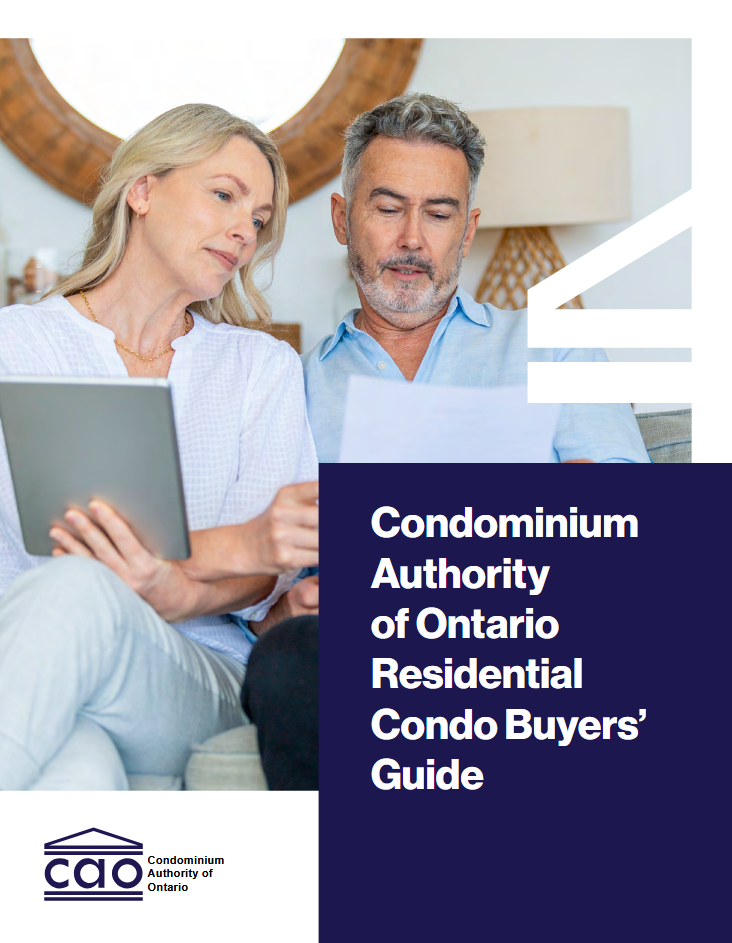Guide
CAO Condo Buyers’ Guide
In the market for a condo in Ontario? Our in-depth guide will prepare you with all the information you need before putting in an offer. Learn what to ask, what documents to review and the fundamentals of condo ownership.
- What is a Condominium?
- Consumer protection for condo buyers
- Buying a Condo Unit
- Moving into a Pre-Construction Condo Unit
- Creating the Condo Corporation
- Tarion and the Ontario New Home Warranties Plan Act
- Introduction to Condo Living
- Condo Corporation Governing Documents
- Condo Governance
- Information Certificates and Records
- Condo Finances
- Repair and Maintenance Obligations
- Issues and Dispute Resolution
- The Condominium Authority of Ontario
About the guide
The Condo Buyer’s Guide was developed by the Condo Authority as a helpful resource for buyers considering a residential pre-construction or re-sale condo unit.
Developers or landowners must provide this guide to all buyers, who in turn have a 10-day cooling off period in which to rescind the agreement of purchase and sale of their condo. This 10-day period starts from the moment buyers have the purchase agreement, disclosure statement and this guide.
What is a condominium?
Most people think of condos as high-rise residential towers in urban areas. A better way to think of a condo is as a shared real estate ownership structure. Owners collectively share ownership of the condo corporation’s common elements and assets. Condo living also involves community engagement, as owners participate in collective decision-making. Condos are also diverse, with many existing in suburban and rural areas as well as urban centres, and with unique and differing set ups.
This means that purchasing a condo comes with duties, responsibilities and rights. Learn what those are in this section, as well as what all the different kinds of condo corporations are.
Consumer protection for condo buyers
It pays to be informed! Ontario home buyers, whether they are purchasing for residential or investment purposes, have access to several housing consumer protection organizations that help protect consumers. There are five in total, each with different responsibilities. Learn about them and what they do in this section.
Buying a condo unit
Explore the essential steps and decisions involved in purchasing a condo unit, whether it’s new or resale. This section helps you understand what to review and how to make sense of the documents and legalities involved. Topics include:
- Buying pre-construction, including what documents to review
- Buying re-sale
- Leasing a unit
Moving into a pre-construction condo unit
Buying a pre-construction condo involves unique phases before you become the official owner. Learn what interim occupancy means, what your rights and obligations are during that time, and how the final closing process works.
Creating the condo corporation
Before a condo community becomes self-governing, the condo corporation must be created and registered. This section explains how ownership transitions from the developer to the owners, and how the governance process officially begins.
Tarion and the Ontario New Home Warranties Plan Act
New condo buyers benefit from mandatory warranty coverage provided by Tarion. Find out what’s protected — including deposits, delayed occupancy, and defects — and how to make a claim when something goes wrong.
Introduction to condo living
Condo living is a unique form of homeownership that blends private ownership with communal life. This section explores what to expect in daily condo living and how responsibilities are managed in a shared community.
Condo corporation governing documents
Your condo community is shaped by key legal documents that outline how the building is managed and what rules owners must follow. This section introduces:
- The declaration
- By-laws
- Ruless
Condo governance
Decisions within your condo are made through a formal governance structure. Learn about how boards are formed, what authority they hold, and how owners can get involved in the process.
Information certificates and records
Transparency and accountability are important in a condo corporation. This section explains what kinds of information must be shared with owners, and how you can access records related to finances, governance, and more.
Condo finances
Understanding how your condo corporation handles money is essential for every owner. This section breaks down how fees are calculated, how financial reports work, and what the reserve fund is used for.
Repairs and maintenance obligations
Knowing who is responsible for repairs can prevent disputes and confusion. This section clarifies whether it’s the owner or the corporation that handles different types of maintenance, and when unit access may be required.
Issues and dispute resolution
Disagreements in a condo community can happen, but there are collaborative ways to address them. This section outlines methods for resolving disputes informally or formally, including how to access the Condominium Authority Tribunal.
The Condominium Authority of Ontario
The CAO supports condo owners, residents, and boards across Ontario with tools, training, and dispute resolution. Whether you need help understanding your rights or resolving a conflict, the CAO is here to assist.
